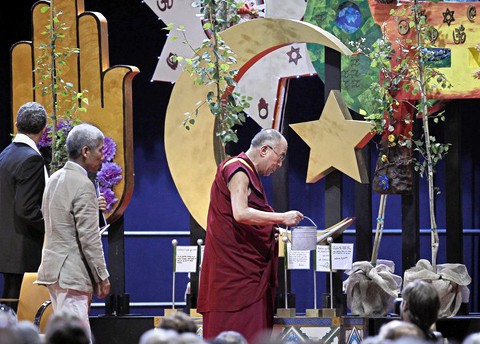
The Dalai Lama was in a jolly-good mood on Sunday, and so was his audience.
More than 8,000 spectators lined up in the heat and patiently waited to pack the pavilion at the University of Illinois in Chicago. The Tibetan spiritual leader had come to give a lesson about overcoming religious strife.

Photo: José M. Osorio, Chicago Tribune / July 17, 2011 )
The Dalai Lama waters some trees, part of the stage production, at the conclusion of an event at the University of Illinois-Chicago on Sunday. The Aspen saplings will be planted near Foster Beach. While the saplings will be planted individually, their roots will become intertwined, symbolizing the Dalai Lama’s belief that the world’s religions can co-exist.
But for many in the crowd, it was much more than a lecture by His Holiness, Tenzin Gyatso, the world-renowned Buddhist monk and 14th Dalai Lama of Tibet. It was an intimate conversation with an avuncular old friend who doesn’t take himself too seriously, but came to share a few wise words about overcoming the conflicts that keep us from enjoying life.
“If you’re not in a hurry, I’m quite free,” he said checking his watch when the master of ceremonies suggested time was running out.
But his message was short and sweet: it all comes down to happiness.
“More and more people are showing spiritual interest in what I call inner values,” said the Dalai Lama, 76, who in March gave up political authority over the Tibetan government-in-exile to focus on his spiritual role. “We all come from a mother’s womb … everyone wants (a) happy life … everyone has a right to further that desire.”
Happiness begins with honesty, which creates trust, which leads to friendship, which means happiness, he said.
Religion has nothing to do with it, he said, adding that moral principles are not rooted in religious doctrine, but the pursuit of happiness. Even people who identify as secular share that goal with people of faith, he said.
“When I say secular, I don’t mean negative feelings toward religion,” he said.
The Dalai Lama also explained that science and faith can co-exist and, in fact, work in concert to teach the world about interdependence.
“Faith and reason must go together,” he said. “You must investigate reality. Nobody can say I know everything.”
Matt MacGregor, 29, of Indianapolis appreciated the Dalai Lama’s point that respect extends to non-believers.
“That’s a word that’s incredibly inclusive,” said MacGregor who runs a global health care foundation.
Phillip Sylvester, 45, who splits his time between Chicago’s Gold Coast and Miami, said he suspected the Dalai Lama would have an open mind about religion, but still wanted to hear it firsthand.
“We are all bound by the same things. The truth is all religions are instilled with the same meaning,” said Sylvester, a self-acclaimed globetrotter. “You can travel around the world and learn that or come here.”
Sun Kang, 29, of Chicago’s Uptown neighborhood, said her family’s Buddhist background and her personal experience as a peace activist led her to the pavilion on Sunday.
Not only did she seek to be in the Dalai Lama’s presence, she also wanted to witness how a city with a tiny Buddhist population would receive him. She was pleasantly surprised.
“Just his physical presence alone tempered us and made us all a lot nicer today,” she said, referring to respectful silence that befell the crowd and the “environment of generosity and compassion” that people created in long concession lines.
“The greater hope is maybe it’s not particular to Buddhism,” Kang said. “Your role in this world shouldn’t be self-centered. When you walk away, you should aspire to try to live the life the Dalai Lama is asking you to live. He’s offering you the choice.”
After his remarks, the Dalai Lama and event organizers watered a dozen Aspen saplings on stage that later will be planted near Foster Beach. While the saplings will be planted individually, their roots will become intertwined, symbolizing the Dalai Lama’s belief that the world’s religions can co-exist.
On Monday, the Dalai Lama will participate in a multi-faith panel discussion with Jewish, Muslim and Christian scholars from 9:30 to 11:30 a.m. at the Harris Theater for Music and Dance in Millennium Park.
